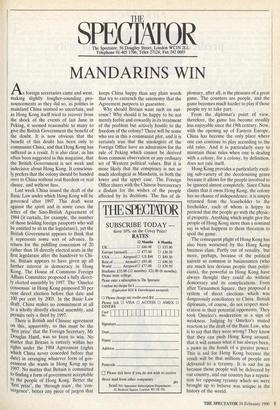SPECT TFE ATOR
The Spectator, 56 Doughty Street, London WC1N 2LL Telephone 01-405 1706; Telex 27124; Fax 242 0603
MANDARINS WIN
As foreign secretaries came and went, making slightly tougher-sounding pro- nouncements as they did so, as politics in mainland China seemed so uncertain,. and as Hong Kong itself tried to recover from the shock of the events of last June in Peking, it seemed reasonable to many to give the British Government the benefit of the doubt. It is now obvious that the benefit of this doubt has been only to communist China, and that Hong Kong has suffered as a result. It is also clear, as has often been suggested in this magazine, that the British Government is not weak and indecisive about Hong Kong. It conscious- ly prefers that the colony should be handed over to China without real freedom or real choice, and without fuss.
Last week China issued the draft of the Basic Law under which Hong Kong will be governed after 1997. This draft went against the spirit and in some cases the letter of the Sino-British Agreement of• 1984 (it curtails, for example, the number of those holding foreign passports who will be entitled to sit in the legislature), yet the British Government appears to think that it represents some sort of advance, In return for the piddling concession of 20 rather than 18 directly elected seats in the first legislature after the handover to Chi- na, Britain appears to have given up all further interest in democracy in Hong Kong. The House of Commons Foreign Affairs Committee proposed a fully direct- ly elected assembly by 1997. The `Omelco consensus' in Hong Kong proposed 50 per cent direct election before that date and 100 per cent by 2003. In the Basic Law draft, China makes no commitment at all to a wholly directly elected assembly, and Permits only a third by 1997.
There is British and Chinese agreement on this, apparently, so this must be the 'first prize' that the Foreign Secretary, Mr Douglas Hurd, was so keen to win. No matter that Britain is entirely within her rights under the 1984 Agreement (rights Which China never conceded before that date) in arranging whatever form of gov- ernment she wants in Hong Kong up to 1997. No matter that Britain is committed to finding a form of government acceptable to the people of Hong Kong. Better the first prize', the 'through train', the 'con- vergence', better any piece of jargon that keeps China happy than any plain words that try to entrench the autonomy that the Agreement purports to guarantee.
Why should Britain want such an out- come? Why should it be happy to be not merely feeble and cowardly in its treatment of the problem but actively hostile to the freedom of the colony? There will be some who see in this a communist plot, and it is certainly true that the sinologists of the Foreign Office have an admiration for the rule of Peking which cannot be derived from common observation or any ordinary set of Western political values. But it is more likely that the conspiracy is not so much ideological as Mandarin, in both the lower and the upper case. The Foreign Office shares with the Chinese bureaucracy a disdain for the wishes of the people affected by its decisions. The fun of di- plomacy, after all, is the pleasure of a great game. The counters are people, and the game becomes much harder to play if those people try to take part.
From the diplomat's point of view, therefore, the game has become steadily less enjoyable since the 19th century. Now, with the opening up of Eastern Europe, China has become the only place where one can continue to play according to the old rules. And it is particularly easy to maintain these rules when one is dealing with a colony, for a colony, by definition, does not rule itself.
Hong Kong provides a particularly excit- ing sub-variety of the decolonising genre because it allows for the people involved to be ignored almost completely. Since China claims that it owns Hong Kong, the colony has no chance of independence: it is simply returned from the leaseholder to the freeholder, each of whom is happy to pretend that the people go with the physic- al property. Anything which might give the people of Hong Kong more than a nominal say in what happens to them threatens to spoil the game.
The consequent plight of Hong Kong has also been worsened by the Hong Kong businesS class. Partly out of venality, but more, perhaps, because of the political naïveté so common in businessmen (who are much less devious people than politi- cians), the powerful in Hong Kong have always thought they could do without democracy and its complications. Even after Tienanmen Square, they proposed a system of direct elections which was dangerously conciliatory to China. British diplomats, of course, do not respect mod- eration in their potential opponents. They took Omelco's moderation as a sign of weakness. Judging by Omelco's muted reaction to the draft of the Basic Law, who is lo say that they were wrong? They know dial they can push Hong Kong around, that it will remain what it has always been, a pawn in the hands of a greater power. This is sad for Hong Kong because the result will be that millions of people are delivered to a tyranny. It is sad for us because those people will be delivered by our country, and our country has a reputa- tion for opposing tyranny which we were brought up to believe was unique in the history of the world.


















































 Previous page
Previous page